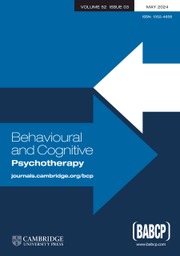-
- Get access
- Contains open access
- ISSN: 1352-4658 (Print), 1469-1833 (Online)
- Editor: Paul M Salkovskis Oxford Institute of Clinical Psychology Training, UK
- Editorial board
This international, multidisciplinary journal is aimed primarily at members of the helping and teaching professions. It features a broad scope of original research papers in both experimental and clinical work contributing to the theory, practice and evolution of cognitive and behaviour therapy. Under the guidance of an international editorial team, the journal reflects on and influences developments in its field, encompassing most areas of human behaviour and experience, and representing many research methods from randomized controlled trials to single-subject experimental designs.
Recently Published Articles
Cambridge Blog

-
Breaking Down Barriers: Providing Equitable Access to Evidence-Based Treatment for Eating Disorders
- 18 March 2024,
- The March BABCP Article of the Month is from the Cognitive Behaviour Therapist (tCBT) and is entitled “Equitable access to evidence-based treatment for...

-
Mapping evidence-based interventions to the care of unaccompanied minor refugees using a group formulation approach
- 26 January 2024,
- The January BABCP Article of the Month is from Behavioural and Cognitive Psychotherapy (BCP) and is entitled Mapping evidence-based interventions to the care ‘Stop the boats’ slogans dominate current headlines.…...

-
Optimising DBT for LGBTQ+ Young People; Learning from the Wisdom of our Clients.
- 14 December 2023,
- The December BABCP Article of the Month is from the Cognitive Behaviour Therapist (tCBT)and is entitled Gender- and Sexuality-Minoritised Adolescents in DBT:...




Tweets by BCP and tCBT
Facebook